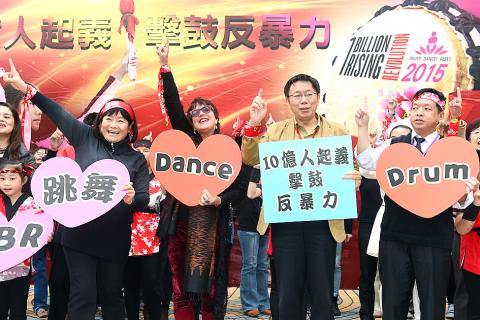Playwright and activist Eve Ensler yesterday attended a “One Billion Rising” rally against domestic violence held by the Garden of Hope Foundation that included independent Taipei Mayor Ko Wen-je (柯文哲) as the guest of honor.
“In recent years, reported cases of rape and domestic violence in Taipei have continually risen,” Ko said. “We want to make Taipei a society free from violence.”
Ensler, best known for her play The Vagina Monologues, launched what is known as the V-day movement in 1998 to end violence against women and promote gender equality, adding the “One Billion Rising” campaign in 2012.

Photo: Chien Jung-fong, Taipei Times
The number in the campaign’s title refers to the estimated number of people worldwide who have experienced domestic violence or sexual abuse.
With Garden of Hope Foundation chief executive Chi Hui-jung (紀惠容) and nearly a dozen activists from women’s rights groups across Asia, Ko and other rally participants pointed toward the sky in a symbolic gesture of solidarity with survivors of abuse.
Chi said in a statement during the event that the campaign intends to launch a “revolution” to “eradicate all forms of patriarchy and inequality.”
Ensler said she was “moved and impressed” by the accomplishments of local women’s rights groups.
“The general atmosphere of cooperation between women’s groups and the government is not something you see in every other nation,” she said.
Abha Bhaiya, the national coordinator of the One Billion Rising campaign in India, said that cooperation between government agencies and non-governmental organizations is much more prominent here than in India, adding that she was impressed that the Taipei City Government includes an official consultant on gender issues.
However, she also said that there is still room for progress in tackling male culture and patriarchy.
“Patriarchy is still influential in [Taiwanese] society. Not enough importance is placed on women’s issues by male politicians,” she said.
At the event yesterday, Ko also joined with Ensler and other activists — including local representatives and participants from India, China, Japan, Mongolia, Philippines and other nations — in a long drum performance while chanting: “One billion rising; drum against violence.”
Ko tried to leave the stage before a dance performance that followed the drumming, but was restrained by Chi.
He appeared uncomfortable during the dance performance, and left immediately after, refusing to answer questions from reporters, as had been promised earlier.
After being chased by reporters through half the length of Taipei City Hall, Ko agreed to accept questions before disappearing for several minutes into his office.
When Ko emerged he said he disliked the way the event had been “clownishly executed,” adding that he had not been notified about the dance performance beforehand.
“When a lion opens its mouth to smile, all that other animals see are rows of sharp white teeth,” he said when asked whether he had yelled at subordinates during the minutes before he emerged from the mayoral suite.

Taiwanese can file complaints with the Tourism Administration to report travel agencies if their activities caused termination of a person’s citizenship, Mainland Affairs Council Minister Chiu Chui-cheng (邱垂正) said yesterday, after a podcaster highlighted a case in which a person’s citizenship was canceled for receiving a single-use Chinese passport to enter Russia. The council is aware of incidents in which people who signed up through Chinese travel agencies for tours of Russia were told they could obtain Russian visas and fast-track border clearance, Chiu told reporters on the sidelines of an event in Taipei. However, the travel agencies actually applied

New measures aimed at making Taiwan more attractive to foreign professionals came into effect this month, the National Development Council said yesterday. Among the changes, international students at Taiwanese universities would be able to work in Taiwan without a work permit in the two years after they graduate, explainer materials provided by the council said. In addition, foreign nationals who graduated from one of the world’s top 200 universities within the past five years can also apply for a two-year open work permit. Previously, those graduates would have needed to apply for a work permit using point-based criteria or have a Taiwanese company

The Shilin District Prosecutors’ Office yesterday indicted two Taiwanese and issued a wanted notice for Pete Liu (劉作虎), founder of Shenzhen-based smartphone manufacturer OnePlus Technology Co (萬普拉斯科技), for allegedly contravening the Act Governing Relations Between the People of the Taiwan Area and the Mainland Area (臺灣地區與大陸地區人民關係條例) by poaching 70 engineers in Taiwan. Liu allegedly traveled to Taiwan at the end of 2014 and met with a Taiwanese man surnamed Lin (林) to discuss establishing a mobile software research and development (R&D) team in Taiwan, prosecutors said. Without approval from the government, Lin, following Liu’s instructions, recruited more than 70 software

Chinese spouse and influencer Guan Guan’s (關關) residency permit has been revoked for repeatedly posting pro-China videos that threaten national security, the National Immigration Agency confirmed today. Guan Guan has said many controversial statements in her videos posted to Douyin (抖音), including “the red flag will soon be painted all over Taiwan” and “Taiwan is an inseparable part of China,” and expressing hope for expedited reunification. The agency last year received multiple reports alleging that Guan Guan had advocated for armed reunification. After verifying the reports, the agency last month issued a notice requiring her to appear and explain her actions. Guan